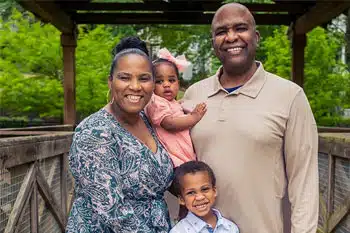
After this journey, most families feel the need for a break, leading many adoptive parents to wonder:
- Can you get parental leave for adoption?
- Is there a chance for paternity leave for adoptive parents?
- Are there FMLA adoption protections similar to those for biological births?
The good news is that these questions have positive answers. This guide will help you understand FMLA adoption leave and how to advocate for your adoption leave rights.
Do You Get Parental Leave for Adoption?
In short, yes. If you work for a covered employer and meet the eligibility requirements, you can take paternity or maternity leave for adoption (eligibility details below).
While no specific act dictates adoption leave, the Family and Medical Leave Act (FMLA) protects adoptive families. Some employers may even offer paid adoption leave during this period.
However, not all employers may be supportive, so understanding your adoption leave rights is crucial. This guide will help you navigate and advocate for those rights.
What is Adoption Leave?
Adoption leave functions similarly to traditional maternity leave. Your employer’s policies will determine how long your leave lasts. It will also determine whether or not your employer will pay you during your leave. The FMLA protects both maternity leave for biological children and adoption leave.
Taking a leave from work is important: it allows you to bond with your newly adopted baby. That’s why adoption leave exists. It allows new parents time to adjust to their new family dynamic and provide their children with the necessary care.
What Is the Family and Medical Leave Act (FMLA)?
The FMLA, enacted in 1993, enables eligible employees of covered employers to take unpaid leave for specific family and medical reasons. It also dictates that the employer must restore the employee to the same or a virtually identical position at the end of their leave period.
Eligible Employees
You are eligible for FMLA leave for adoption if you:
- Work for a covered employer (details below)
- Have worked at least 1,250 hours in the previous calendar year
- Work for a company with 50 or more employees
- Have been with your employer for at least 12 months
Covered Employers
Most employers must meet FMLA standards. Covered employers include public agencies, local education agencies, and private sector employers with 50 or more employees. Smaller private companies may not be federally required to provide unpaid maternity leave for adoption.
Specified Family and Medical Reasons
The FMLA protects eligible employees for various reasons, including:
- A serious medical condition
- To provide care for a family member with a severe medical condition
- The birth of a new baby
- The placement of a child through private adoption or foster care
Understanding Your Rights
Those considering adoption have guaranteed adoption leave rights if they meet FMLA qualifications. While the FMLA provides federal protection for adoption leave, many advocate for a more inclusive version that guarantees paid maternity leave, which is yet to be available in all states.
For more detailed information, the Department of Labor’s website provides answers to the most frequently asked questions.
What are the psychological benefits of parental leave for adoptive parents?
Adoption leave is essential for new parents who have adopted a child. Here are some reasons why adoption leave matters:
Bonding with their child: Adoption leave allows adoptive parents to spend crucial time bonding with their baby, fostering a healthy, strong attachment.
Adjusting to a new family situation: Adopting a child is a significant life change. Adoption leave gives both the child and the parents the necessary time to settle into their new roles and adjust to their new family dynamic.
Supporting child development: The early months of a child’s life are important for their development. Having a parent present during this period can significantly enhance the child’s well-being.
Reducing stress: Adoption can be a stressful process. Adoption leave helps reduce this stress by providing adoptive parents with time off from work, allowing them to focus on their new family and adjust to their new roles.
Equalizing parental leave: Adoption leave policies ensure that adoptive parents receive the same benefits as biological parents. This equality in parental leave opportunities helps adoptive parents bond with and care for their child just as effectively.
Why do adoptive parents need parental leave?
Maternity and paternity leave for adoption are crucial for hopeful adoptive families for several reasons:
- To adhere to the Interstate Compact on the Placement of Children (ICPC), parents may need to stay in the state where their child is born for 7 to 10 business days.
- New adoptive parents need time to bond with their child when they bring them home.
FMLA leave for adoptive parents provides the time needed to complete the placement and begin the process of bonding with their baby.
An employee’s right to leave for adoption ends 12 months after placement. Employees can also use FMLA leave before the actual placement or adoption of a child in some situations, including these examples:
- Appearing in court
- Attending counseling sessions
- Consulting with the attorney representing the birth parent
- Having a physical examination
- Traveling to complete an adoption
Your Adoption Leave Rights
If you’re an eligible employee who works for a covered employer, you can take protected adoption leave. Many employers support parents during this time, with some even offering adoption leave pay beyond federal requirements.
To navigate adoption leave, speak with your director or HR representative early in your adoption process. Ask them about your company’s adoption leave policy and whether it includes adoption leave pay.
While the FMLA protects your right to adoption leave, it does not guarantee paid leave. Discussing your leave with your employer early on can clarify expectations and improve the situation for both sides.
Advocating for Leave
However, some employers may not be as generous or supportive. Unfortunately, pregnancy discrimination exists, and adoptive parents might face similar issues if an employer resents the loss of productivity due to adoption leave.
You can propose changing the policy if they don’t permit paid time off for adoption. Educate yourself on the Family and Medical Leave Act (FMLA) and its requirements for employers.
We encourage you to discuss with your employer the fairness of offering leave to employees who become parents through adoption, similar to those who become parents by birth. Highlight the long-term benefits of early attachment in a child’s life to strengthen the argument.
The Dave Thomas Foundation for Adoption offers a wonderful resource about parental leave for adoption. It’s a free kit called Adoption-Friendly Workplace Employer Toolkit. Find out more and request a kit at DaveThomasFoundation.org. Once you receive the kit in the mail, you can pass it along to your HR department.
Parental Leave for Adoption
Before you apply for adoption leave, we encourage you to review your employer’s policy. This research will allow you to understand the length of the leave and the eligibility requirements.
It’s also a good idea to discuss your plans for returning to work with your employer before you begin your adoption leave. That way, they can arrange coverage for your responsibilities while you are away. The discussion may also include requesting flexibility in your work schedule or changing your duties. Ensure you plan your adoption leave to make the most of your time off.
Finally, depending on your employer’s policy, you may need to stay in touch during your maternity leave for adoption. For example, you may need to attend occasional meetings or update your plans for returning to work.
Adoption leave is an important part of any new family’s journey. It allows new adoptive parents the time they need to welcome their child into the world. Every new parent needs time to bond with their child, no matter how they choose to build their family. This getting-to-know-you stage is just as important for you as it is for your adopted child.
Editor’s Note: This article was originally published on October 10, 2016, and has since been updated.
Founder of Lifetime Adoption, adoptive mom, adoption expert, and Certified Open Adoption Practitioner (C.O.A.P).
Since 1986, adoption expert Mardie Caldwell has been dedicated to bringing couples and birth parents together in order to fulfill their dreams.
“Many years ago, I was also searching for a child to adopt. We didn’t know where or how to get started. Through research, determination, and a prayer, our dream of a family became reality. I started with a plan, a notebook, assistance from a caring adoption consultant and a lot of hard work; this was my family I was building. We had a few heartaches along the way, but the pain of not having children was worse!
Within weeks we had three different birth mothers choose us. We were overwhelmed and delighted. Many unsettling events would take place before our adoption would be finalized, many months later. Little did I know that God was training and aligning me for the adoption work I now do today. It is my goal to share with our families the methods and plans which succeed and do not succeed. I believe adoption should be affordable and can be a wonderful “pregnancy” for the adoptive couple.
I have also been on both sides of infertility with the loss of seven pregnancies and then conceiving by new technology, giving birth to a healthy daughter. I have experienced first-hand the emotional pain of infertility and believe my experience allows me to serve your needs better.
It is my hope that for you, the prospective parents, your desire for a child will be fulfilled soon.”






0 Comments